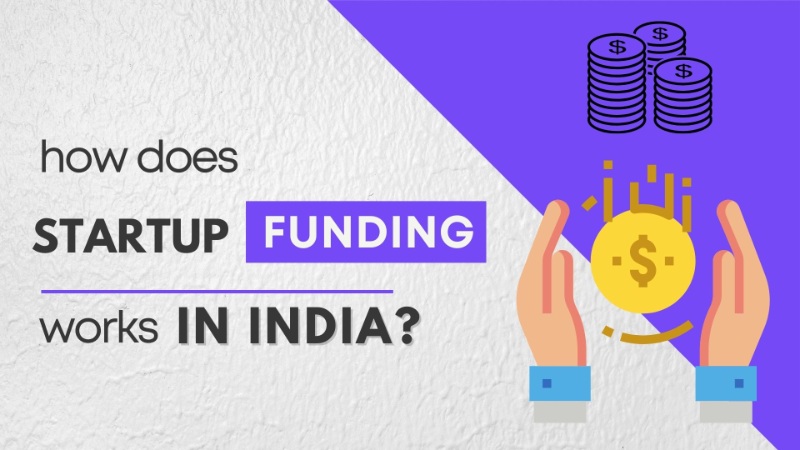Pretty much every startup dreams of getting funded. Of course, if you are someone who wants to bootstrap your company and are ok with the slow & steady pace, then this question doesn’t arise.

But if you have landed on this article, I am sure that one day you will be planning to raise funds for your startup.
No matter how humble the beginning of your business idea is. As it starts to take shape, there is going to be a time when opportunities & possibilities are going to be huge, but resources are going to be limited. That is the time when you start thinking about raising funds.
After all, what raising funds do is get things moving at a faster pace & accomplish results that are beyond your reach.
But let me tell you this. Startup funding in India is a bit of a complex process with a lot of moving parts. It can become a confusing affair if you are not well aware of the different stages of funding.
You have to manage to get through these stages of startup funding without getting stuck. Thus, to help you gain clarity about this & make you familiar with the process, we are going to discuss 7 different stages of funding that Indian startups go through.
If you stay till the end, we will also shed some light on how your startup can accelerate the growth & get started with raising the funds.
1. Pre-Seed Funding
Pre-seed funding is also called pre-seed capital. This is the beginning of your startup journey.
To explain it in the simple term, pre-seed funding is the investment that you will require even before you initiate your business. And the investment amount is the smallest one compared to other stages.
You can get funded in the pre-seed stage from your friends, family, investors, or even through crowdfunding. The pre-seed investors can ask for a stake in your company in return for the invested money.
As at this stage, your Startup is not in function, this stage of funding is not considered as an actual funding round.
Why do you need Pre-Seed Funding?
- To conduct product research.
- To help with the initial formation of a company.
- To make a Minimum Viable Product.
- To prepare for future operations.
- To identify market opportunities.
2. Seed Funding
This is where your startup actually steps on the ground. All your research is done, your product or services are ready to get in action & your business model is well planned.
Now you need to step out and start making actual transactions with your customers. This is where seed-funding, also called seed capital, will come to your support.

This is considered the first round of startup funding, unlike pre-seed rounds when the startup is not practically functional yet.
Seed funding is generally raised from an investor who puts in a larger amount, to begin with, and in return, asks equity from your company.
Why do you need Seed Funding?
- To launch your product.
- To acquire new customers.
- To hire employees.
- To run marketing & advertising campaigns.
- To test the markets for product-market-fit.
3. Series A Round
And now at this stage comes the beginning of a venture capitalist investment. You start offering the shares in your company in return for the investment done.
This is the phase when your company starts to grow and sets up for take-off. The research & testing phase of the market is done and now you are looking ahead to go with full throttle.

Very few companies actually make it to this point. That’s why preparing your startup & having a plan to reach the Series A round is very important to keep things growing.
Investors don’t just look for innovative ideas or a great vision from the founders of a startup. Now they are looking for a solid strategy that will make executing the business plan a successful game.
Why do you need Series A Funding?
- To prepare for scaling up.
- To optimize the operations & increase productivity.
- To make further modifications & development to your product or services.
- Work on profitability & reduce the initial losses.
- To step up from the seed level.
4. Series B Round
Once you have proven yourself with the winning product(s) & are making consistent profits, you decide to step up your game even more. This is where going for a Series B funding or a Series B round helps.
Startups who were successful to raise Seed funding as well as the Series A round and who have proven their potential by now go for Series B funding to get growing.
Till this point they already have some customer base, a solid foundation in terms of business functionality, and measurable data indicating what is working & what is not in their hands.
All this makes it easy for the startups to convince the investors to go ahead with the funding. Investors also get a clear idea by now about how big it can get in the future.
The procedure and attributes of Series B funding are somewhat similar to the Series A round except for the venture capital firms who have their specialization in taking an entry at the later stage of a startup journey.
Why do you need Series B Funding?
- To increase your market reach.
- To expand your team & acquire new talents
- Work on business development.
- Increase expenditure on marketing & advertising.
- To expand the departments within the organization.
5. Series C
It’s a no-brainer that only the companies who are already doing well and have succeeded in their market go-ahead for the Series C round.
Compared to previous rounds, it is easiest for the business to raise the Series C round as the growth of the company is already being witnessed.
If Series B was all about stepping up the game, Series C is all about making big. The amount of money to be raised in the Series C round is huge and groups like hedge funds, investment banks & private equity funds anticipate stepping in the game.
Startups whose business model has worked well & is confident about the efficiency of their function now look for more rapid growth.
Scaling up at this stage happens at a bigger level. A startup sets up to become a MultiNational Company.
Why do you need Series C Funding?
- Expand the reach to a global market.
- Work on new products or services that have emerging potential.
- Acquire other small companies to expand the network.
- Look for more ways to bring in revenue.
- Boost the valuation & prepare for IPO.
6. Series D, E & Beyond
These rounds don't end at Series C. Though most of the companies end raising funds externally after Series C, there are few other companies who go-ahead to raise funds for Series D, Series E and so on.
There are several reasons why companies go on to raise the funds even if they are able to raise good capital in Series C. The reasons are as follows -
- To fulfill the responsibilities or eligibility criteria required for getting listed at IPO.
- To accomplish the goals that remained unachieved during the Series C phase.
- To open up advanced revenue opportunities.
There is no specific limit on how many rounds one can go for in Series funding. It all boils down to what are the requirements of the company and what goals are they looking to achieve.
7. IPO (Initial Public Offering)
When it comes to the journey of a startup, an IPO is said to be the peak of its success. Success not in terms of results, but in terms of the startup’s journey.
At this stage, for the very first time, shares of the company are offered for purchase to the public. Now the company is ready to function at a whole new level.

The facility of IPO is used to raise funds for not only growing the company even further but also allows the owners of the startup to encash the shares they already have. It's payoff time for all their efforts too!
Why do you need to go for an IPO?
- For growing & expanding the business even further.
- Requirement of huge infusion of capital to scale up the operations.
- For paying off the debt (if any).
- Improving the credibility & the market worth of the company.
- Boosting the public profile of the company (and gaining publicity).
Get Your Startup Funded
I hope by now you must have got a good clarity about how funding for startups works in India. We all know that starting a business is hard work. But it’s also a very rewarding one.
Many people dream of having their own startup company, but they don’t know the right steps to take along the way. And the first step to start progressing in your own business plan is to find funding for your startup.
But, do you know only 5% of startups get funded & about 90% of them fail with execution as their main problem.
Yes, that’s why as I promised you at the beginning of this article, we have a solution to not only help your Startup grow, accelerate and succeed but also help it get funded.
Here at Foundership, we have very carefully curated programs specifically designed for Startups in the pre-seed or seed stage and help them with Coaching, Capital & Connect.
To know more about our programs & how they can help you, visit our Programs page.
If you have any other queries regarding Startup funding or anything related to Startups, feel free to send us an email here - we@foundershiphq.com and we will try our best to solve it for good.


